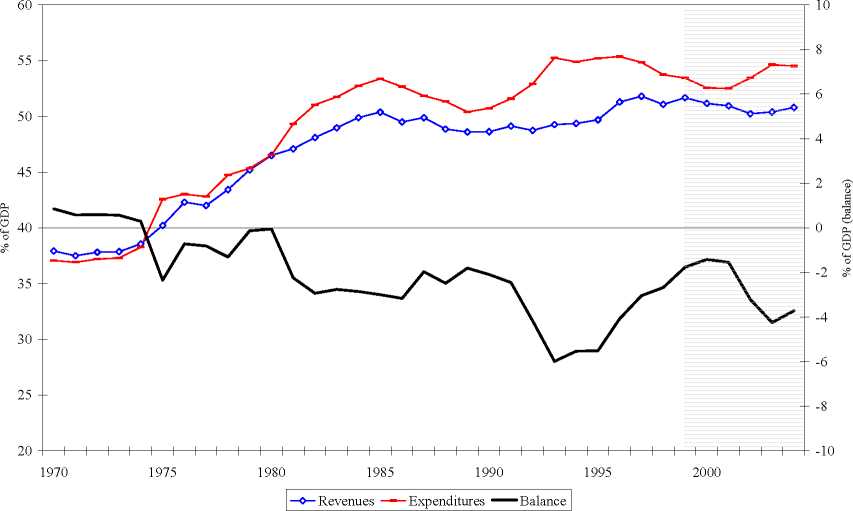situation of excessive deficit.68 Recent developments cannot be seen without taking into
account past actions and trends in public finances.69 We focus attention on the evolution
of public finances since 1970 in the countries that initially ’sinned’ to the Pact (France,
Germany and Portugal).
We report in Figure 5.1 the general government balance, and its breakdown in revenue
and expenditure ratios. A simple visual inspection shows that expenditure and revenue
ratios have been following an increasing trend notably in France, Portugal and Spain. But
with revenues lagging the expenditure rises, there has been a continuous deficit bias.
There were some good reasons in 1991 to embark on consolidation by enshrining the 3%
deficit target in the criteria for EMU-entry. The Maastricht rules have been effective in
constraining further buoyant expenditure rises. Less than commensurate rises in revenue
intake have led to persistent albeit gradually declining deficits. Since the start of EMU,
fiscal positions have started to slip away again. As to the reasons for the breach of the
Stability and Growth Pact, further expenditure rises in France and Portugal seem to
blame, whereas in Germany large revenue reductions unmatched by expenditure cuts
have pushed the deficit beyond the 3% threshold. Spain, on the other hand, stands out for
its balanced budget over recent years, which is the result of a sustained reduction in
expenditures since 1993 that has levelled off in recent years. We consider Spain as an
example of more prudent fiscal behaviour.
Figure 5.1 General Government Spending, Revenue and Deficit (% of GDP)
France

Note: Left-hand scale - revenue or spending / right-hand scale - deficit.
68
69
The other countries that faced an EDP are the Netherlands, Slovakia, Poland, Malta, Hungary,
Cyprus and the Czech Republic. For further details see the EC web site at:
http://europa.eu.int/comm/economy_finance/about/activities/sgp/procedures_en.htm.
Afonso (2005) questions the sustainability of public finances in most EU countries.
121
More intriguing information
1. The name is absent2. Der Einfluß der Direktdemokratie auf die Sozialpolitik
3. The name is absent
4. The name is absent
5. Geography, Health, and Demo-Economic Development
6. The name is absent
7. Labour Market Flexibility and Regional Unemployment Rate Dynamics: Spain (1980-1995)
8. Rent Dissipation in Chartered Recreational Fishing: Inside the Black Box
9. Word Sense Disambiguation by Web Mining for Word Co-occurrence Probabilities
10. Firm Closure, Financial Losses and the Consequences for an Entrepreneurial Restart